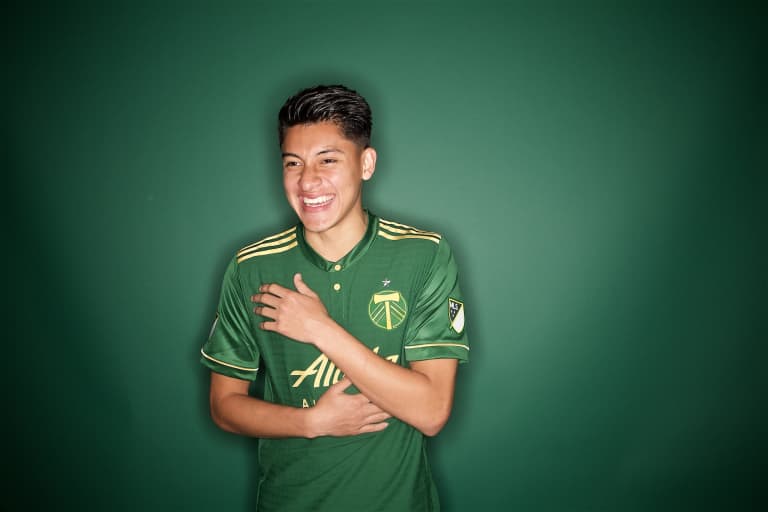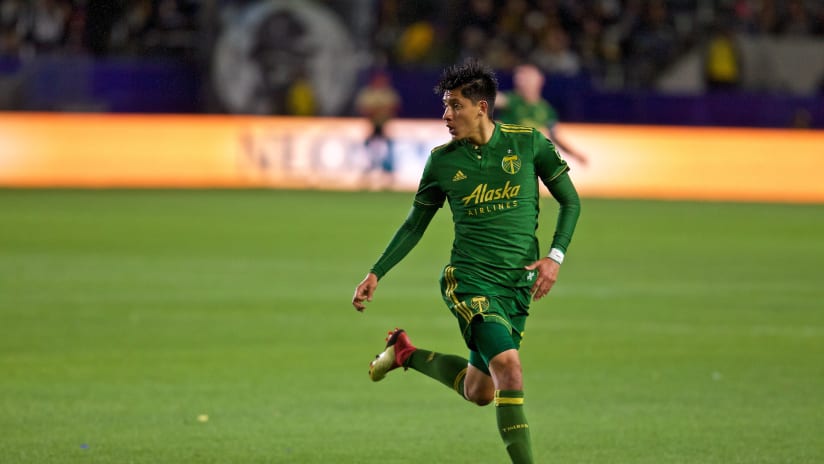Marco Farfan’s Major League Soccer debut on March 12, 2017, against the LA Galaxy vaulted him to the attention of the Portland Timbers’ supporters. Since then, the Gresham, Ore., native’s local ties have combined with his personality to make him a fan favorite. But the personal decision to turn professional at 18 years old wasn’t as straight forward as this smooth transition might imply.
Farfan had never wavered from his desire to be a professional player, but coming from a family with siblings who were going to college, the Timbers fullback had to navigate a conflict. He wanted to pursue his dream as quickly as possible. Other members of his family, however, wanted him to consider a more traditional route.
“For me, deep down, I wanted to play professional soccer,” he said. “My parents also wanted me to go to college. I sat down with them and talked to them about it. They gave me some advice of what I should do. I told them what I wanted to do. So, I decided to sign to play professional soccer, but I’m also doing online college.”
One thing Farfan can’t do, now, is play high-level college soccer. That was the cost of his choice. In turning pro, his NCAA eligibility went out the window.
That doesn’t mean, however, Farfan’s education has stopped.
Now 19, Farfan is pursuing a marketing degree through Southern New Hampshire University – a pursuit his enthusiasm hints is more than a familial compromise. Were it merely a middle ground, though, it would be an understandable one, from both his and his parents’ points of view.
The opportunity to be a professional athlete is a rare, and it’s not something parents typically envision when they’re imagining their child’s course. Those visions usually involve happiness, which entail security, which also entail not helping your children avoid potentially poor decisions.
For good reason, parents usually want their kids to go to school, and if children are forging the type of aid that usually comes with being a high-level athlete, that parental worry becomes even louder.
“It’s kind of like that with me,” Farfan admits, “because my brother, he went to college and finished his four years there and got his degree. They wanted me to do the exact same thing, and my sister is doing college as well. It’s something they wanted me to do, but I decided to play soccer and go to college.”
“They said, it’s your decision. Whatever you decide, we’re going to support you with everything, but just make the decision that you think is best for you and your future.”

It wasn’t the only time Farfan sacrificed part of his life to soccer. That practice dates back farther in his scholastic experience, when social activities involved a tradeoff. Almost always, soccer won out.
“I had to let go of going to high school football games, basketball games, prom, formal, any of that stuff,” he said. “I never got a chance to go to that.
“I could have gone [to dances for] two years, but the first year, I had practice with the [Timbers] Academy that night. The second year, which was last year, I had an [MLS] game against Kansas City. I got to miss that stuff, but just as long as I’m playing, I’m happy. I have my family and friends. As long as I have that support, I’m happy with that.”
His isn’t a revisionist history, or the type of single-mindedness that never considered those alternatives. Farfan has thought about the context. He knows what his decisions entail.
“I wish I could have gone,” he admits, “but I’d much rather be able to playing soccer professionally than go to those things.”
Just past the one-year anniversary of his professional debut, Farfan’s seen the benefits of his dedication, having trained with the Timbers’ first team since the dawn of preseason. He’s also seen the realities of life as a professional.
During the offseason, the team changed coaches and undertook a significant roster shakeup, leaving the squad he returned to much different than the team that left in the fall.
“It’s something new,” Farfan said, reflecting on the differences from preseason training in Tucson, Arizona. “A lot of new faces. A lot of new cultures.
“It just shows what the professional soccer side is like. It can happen to me, at some point. It just shows that every day is like a tryout. You have to come out and perform and try to prove that you’re able to play with players, as a team.”
Through two games of the 2018 season, Farfan has been a major part of that group, having to play 180 minutes after left back Vytas suffered a hamstring injury in the final game of preseason. That status, though, falls in line with the goals Farfan set for himself coming into his second professional season.
“I want to become a full-time starter this season,” he says. “Last year, I got to experience and see how things work, but this year, I feel like it’s the year I need to improve on everything. It has to be a great season for me so I can carry on into my third year.”













